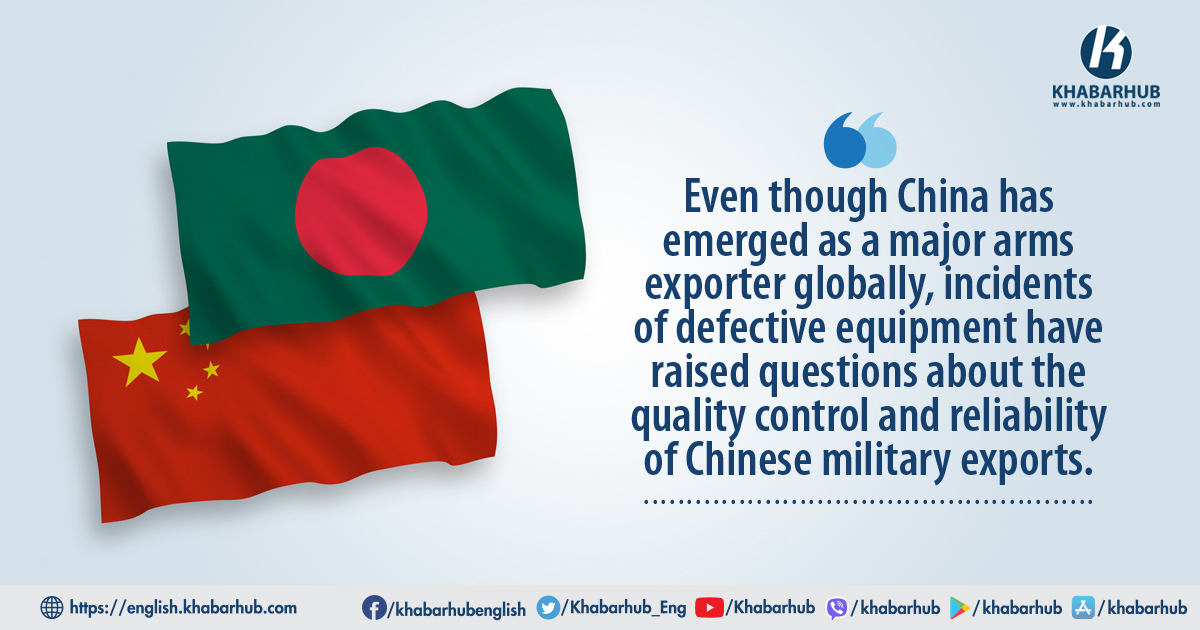China’s arms exports may seem state of the art in its first glance, yet have been categorized as faulty and defective by many importing countries, especially within South Asia.
Bangladesh in specific has grown to become one of China’s closest military partners in the South Asian region.
Over the years, both countries have sought to strengthen their economic and military partnership through a range of measures including agreements and exchanges.
However, the partnership is beginning to come under significant stress due to the prevailing issue of defective military equipment exported by Beijing to Dhaka.
Bangladesh has acquired a sizeable amount of military hardware from China in recent years including corvettes, naval guns, anti-ship missiles and surface-to-air missile systems.
This growing mistrust has not only hindered the effectiveness of the Bangladesh armed forces but is also slowly straining the bilateral relationship between both two countries.
In the past ten years, China has gone from becoming an importer of military equipment to becoming a net-exporter of military hardware.
Between 2010 and 2020, China ranked fifth globally in arms exports, following the United States, Russia, France, and Germany.
Most of China’s arms sales have, since then, been exported to neighboring countries including Bangladesh.
Along with Dhaka, Beijing’s arms exports have heavily been focused on Pakistan, Sri Lanka, Nepal and Myanmar as well.
Since 2010, annual arms sales to Pakistan have averaged 586.9 million TIV. Sri Lanka too has acquired warships and military aircraft such as Harbins and J-7s and so has Nepal including an NPR 2.5 billion grant for military hardware to be bought from China.
Bangladesh on the other hand purchased 2.6 billion TIV worth of weapons between 2010 and 2020, accounting for 73.6% of its foreign military acquisitions during the same period.
Beijing has incentivized these purchases through favorable financing and discounted transfer of two Type-035G Ming-class submarines to Bangladesh.
Moreover, Bangladesh has received the majority of its small arms from China since 2006, totaling over 16,000 rifles and 4,100 pistols.
However, based on reports from Dhaka, China’s trainer aircraft to Bangladesh has developed defects along with the air defense system.
Reports claim the quality of supply for the naval frigates has also come under scrutiny which was supplied by China to the Bangladesh forces.
Thus, seeking accountability collectively with importers of Chinese military equipment coming together, is an avenue that should be utilised extensively to seek greater compensations from Beijing for the losses incurred.
Bangladesh has acquired a sizeable amount of military hardware from China in recent years including corvettes, naval guns, anti-ship missiles and surface-to-air missile systems.
These challenges of defective military equipment have broader implications for China-Bangladesh military cooperation.
It has not only strained the bilateral relationship between the two countries, undermining trust and confidence in their defense partnership but has led to concerns about the reliability of Chinese military technology and the effectiveness of its support for Bangladesh’s defence capabilities.
Furthermore, in a deal between the two countries signed in 2018, China was supposed to deliver trainer jets to Bangladesh, however, the latest reports have claimed that the jets have developed snags that have further delayed the transfer.
Dhaka on its part as a response to these issues should take various steps to address the emerging threat within its military procurement.
Much like Thailand where threats to cancel a deal for the purchase of Chinese S26T Yuan Class submarines for the Thai Navy, were used to include a German-made MTU 396 engine.
Dhaka must employ similar strategies in order to leverage its purchasing power for better deals.
It should also re-negotiate with China for repairs or replacements of faulty equipment and must call for greater transparency and accountability in future defense procurement agreements.
It should also explore diversifying its sources of military hardware, such as with India, the U.S. and Europe to meet its defense needs.
Even though China has emerged as a major arms exporter globally, incidents of defective equipment have raised questions about the quality control and reliability of Chinese military exports.
Thus, seeking accountability collectively with importers of Chinese military equipment coming together is an avenue that should be utilized extensively to seek greater compensation from Beijing for the losses incurred.









Comment